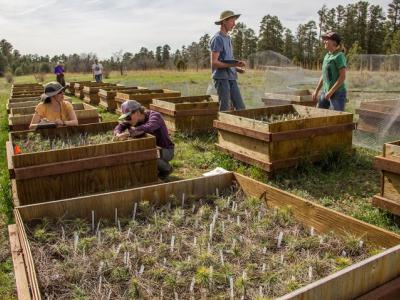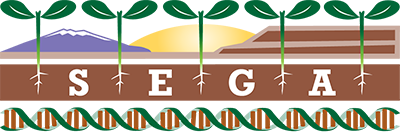You are here
About

Initiated in 2012 with $4 million in seed funding from the National Science Foundation (NSF) and Northern Arizona University these 10 garden sites, will allow research that scales from genes to ecosystems, to test the genetic basis of plant performance along environmental gradients. The predictable changes temperature and moisture that occur along this elevation gradient mean that large scale field trials and monitoring can be carried out under conditions of predicted climate change. Sited on a combination of federal and private lands where soils and vegetation types are representative of large tracts of the southwest, SEGA gardens will generate research findings that can be readily translated into broadly applicable management practices.
The same genotypes of a number of important species are being planted across the sites to quantify the ecological and evolutionary impacts of climate change on: -
- plant communities foundation species of (e.g. cottonwood trees)
- associated communities
- interactions (individual & combined) of native & exotic species
- ecosystem processes emerging from these interactions.
The engineering and data processing technologies being developed at NAU for gathering, managing and analyzing both environmental and next-generation genomics data, means that SEGA provides an unprecedented opportunity to identify the populations and genotypes that can simultaneously cope with both invading species and changing climate conditions.
The genetics information resulting from SEGA studies will scientists to make better informed predictions of the impact of climate change on individual genotypes, species, communities, and ecosystems, which in turn will inform land management and restoration projects. The site array will:
- provide a scientific basis for the concept of managed translocation,
- identify drought tolerant genotypes and source population(s) that perform best at a given location for current and expected future climatic conditions and buffer against loss of ecosystem function,
- help to develop techniques for managing exotic species that are becoming more harmful with climate change.
Data collected by SEGA’s automated environmental monitoring devices (e.g. air temperature and precipitation) at each site as well as background survey data (e.g. soil analyses and irrigation water quality measures) will be made available to the public almost immediately, online.
Researcher-collected data will (with a few specific exceptions, namely the locations of rare or endangered species, data covered under prior licensing or copyright e.g. SPOT satellite data, or data covered by the Human Subjects Act for which release is limited due to confidentiality) will be posted online and made available to the general public, no later than two years from collection and processing.
Theme by Danetsoft and Danang Probo Sayekti inspired by Maksimer
